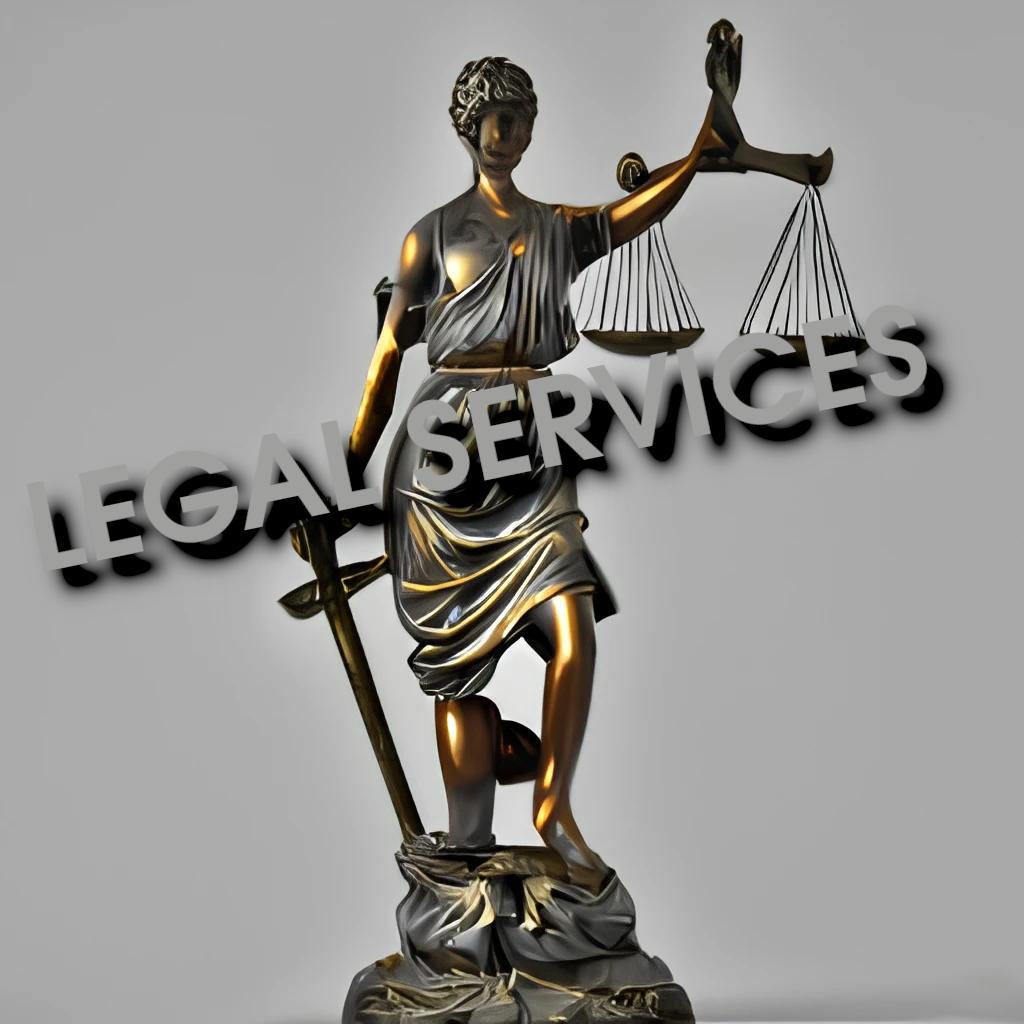


In a world shaped by laws and regulations, legal services are indispensable for individuals and businesses alike. Whether you are seeking legal advice, representation, or assistance with complex matters, understanding the realm of legal services is crucial. In this comprehensive guide, we will explore the types of legal services available, provide insights into choosing the right legal representation, and offer practical tips for effective collaboration with legal professionals.
Types of Legal Services.
Legal Consultation and Advice:
Legal consultation provides individuals and businesses with an opportunity to discuss legal issues and seek advice from qualified attorneys. Whether you're dealing with personal matters, contractual disputes, or business decisions, a legal consultation can offer valuable insights into your rights, responsibilities, and potential courses of action.
Litigation and Court Representation:
For legal matters that escalate to court proceedings, litigators or trial attorneys play a crucial role. They specialize in presenting cases before a judge and jury, navigating complex legal procedures, and advocating for their clients' interests. Choosing an experienced litigator is essential for effective courtroom representation.
Alternative Dispute Resolution (ADR):
Legal services also encompass alternative dispute resolution methods such as mediation and arbitration. ADR provides a less adversarial and more collaborative approach to resolving conflicts, often resulting in faster and more cost-effective solutions compared to traditional litigation.
Choosing the Right Legal Representation.
Specialization and Expertise:
When selecting legal representation, consider the attorney's specialization and expertise. Different legal matters require different skills and knowledge. A lawyer with experience in your specific area of concern is better equipped to provide effective advice and representation.
Reputation and Track Record:
Research the reputation and track record of potential legal professionals. Online reviews, client testimonials, and case outcomes can provide insights into their competence and success rate. A lawyer with a strong reputation is more likely to deliver positive results.
Communication and Accessibility:
Effective communication is paramount in legal matters. Choose a lawyer who communicates, keeps you informed about the progress of your case, and is accessible when you have questions or concerns. A transparent and communicative attorney-client relationship fosters trust and collaboration.
Tips for Effective Collaboration with Legal Professionals.
Be Transparent and Honest:
Openness and honesty are crucial in your interactions with legal professionals. Provide them with all relevant information, even if it seems unfavorable. Full disclosure allows your attorney to build a strong case and navigate potential challenges effectively.
Understand Legal Costs:
Clarify the fee structure with your attorney from the outset. Understand whether they charge hourly rates, flat fees, or contingency fees. Discuss potential additional costs and expenses related to your case. Clear communication about costs helps avoid misunderstandings later on.
Stay Informed:
While legal professionals guide you through the legal process, staying informed about the progress of your case is essential. Regularly communicate with your attorney, ask questions, and seek clarification on any aspects of the legal proceedings that may be unclear.
Solicitors and notaries are both legal professionals, but they have different roles and responsibilities.
Solicitors are legal professionals who provide legal advice and representation to clients, usually in areas such as civil law, criminal law, and corporate law. They may draft legal documents, represent clients in court, and negotiate on their behalf. Solicitors are regulated by professional bodies and must adhere to strict ethical standards.
Notaries, on the other hand, are legal professionals who authenticate and certify legal documents, such as contracts and deeds. They verify the identities of the parties involved, ensure that the documents are genuine, and witness the signing of the documents. Notaries are regulated by professional bodies and must adhere to strict ethical standards.
While solicitors and notaries both work in the legal sector, their roles and responsibilities are different. Solicitors provide legal advice and representation to clients, while notaries authenticate and certify legal documents.
In the legal profession, there are several types of solicitors who specialize in different areas of law. Some common types of solicitors include:
Property solicitors: These solicitors specialize in property law and can assist with the buying, selling, and leasing of real estate.
Corporate solicitors: These solicitors specialize in corporate law and can advise businesses on legal matters such as incorporation, contracts, and mergers and acquisitions.
Employment solicitors: These solicitors specialize in employment law and can advise both employers and employees on matters such as contracts, discrimination, and harassment.
Family solicitors: These solicitors specialize in family law and can advise on matters such as divorce, child custody, and adoption.
Criminal solicitors: These solicitors specialize in criminal law and can represent individuals who are facing criminal charges in court.
Personal injury solicitors: These solicitors specialize in personal injury law and can help individuals who have been injured due to the negligence of others to seek compensation.
There are many types of legal services that are available to individuals, businesses, and organizations. Some of the most common types of legal services include:
Legal advice and consultation: This involves seeking the advice and guidance of a legal professional on a particular matter, such as a business dispute, a criminal charge, or a family law matter.
Contract drafting and review: This involves the creation and review of legal documents, such as contracts and agreements, to ensure that they are legally binding and enforceable.
Litigation and dispute resolution: This involves representing clients in court and other legal proceedings to resolve disputes, such as civil lawsuits or criminal charges.
Estate planning: This involves helping individuals and families plan for the distribution of their assets and property after they pass away, including the creation of wills, trusts, and other estate planning documents.
Intellectual property: This involves protecting and enforcing intellectual property rights, such as patents, trademarks, and copyrights.
Real estate: This involves assisting clients with legal matters related to buying, selling, and leasing property, such as reviewing contracts and resolving disputes.
The term "lawyer" is often used as a general term to refer to anyone who has been trained in the law and is licensed to provide legal advice and representation to clients. In many countries, including the United States, Canada, and Australia, the terms "lawyer" and "attorney" are used interchangeably.
In the United Kingdom and other countries with a similar legal system, such as Australia and New Zealand, the term "solicitor" is used to refer to a legal professional who provides advice and representation to clients, but does not typically appear in court. Solicitors are often involved in preparing legal documents, negotiating settlements, and providing general legal advice.
In contrast, "barristers" are legal professionals who specialize in advocacy and appearing in court. In the UK legal system, solicitors typically refer cases to barristers when litigation or courtroom representation is necessary.
So, in summary, a solicitor is a type of lawyer who provides legal advice and representation, but does not usually appear in court. In some legal systems, such as in the UK, the terms "solicitor" and "barrister" are used to distinguish between different types of legal professionals with different roles and responsibilities.
In the legal profession, a solicitor is a legal professional who provides advice and representation to clients and generally does not appear in court. A barrister, on the other hand, is a legal professional who specializes in courtroom advocacy and representing clients in court. In some countries, such as the UK and Australia, solicitors and barristers are two separate professions, and barristers are typically instructed by solicitors when court representation is required.
MacKenzie Friend is a term used in the legal system, particularly in the UK, to refer to an untrained individual who provides assistance to a litigant in court. MacKenzie Friends are not legal professionals and are not authorized to provide legal advice, but they can provide support and guidance to litigants, particularly those who are representing themselves in court.
In summary, solicitors and barristers are trained legal professionals who provide legal advice and representation to clients, with solicitors primarily handling non-court matters and barristers focusing on courtroom advocacy. MacKenzie Friends, on the other hand, are untrained individuals who provide support and guidance to litigants in court, but are not authorized to provide legal advice.
The responsibilities of a solicitor can vary depending on their area of specialization, but in general, they include:
Providing legal advice: Solicitors are responsible for providing legal advice and guidance to clients on a range of legal matters.
Representing clients: Solicitors may represent clients in negotiations, mediation, and court proceedings.
Drafting legal documents: Solicitors are responsible for drafting legal documents such as contracts, wills, and deeds.
Conducting research: Solicitors may be required to conduct legal research on behalf of clients to provide advice on legal matters.
Managing client files: Solicitors are responsible for managing client files and ensuring that all relevant documentation is in order.
Liaising with other professionals: Solicitors may work with other professionals such as barristers, accountants, and surveyors to provide comprehensive legal advice to clients.
Upholding ethical standards: Solicitors must uphold ethical standards and ensure that they act in the best interests of their clients at all times.
The responsibilities of a solicitor are broad and varied and require a deep understanding of the law and legal procedures.
The responsibilities of a notary public can vary depending on the jurisdiction and the nature of their practice. However, in general, a notary public is responsible for:
Authenticating documents: Notaries public are authorized to authenticate documents by verifying the identity of the signatories and confirming that they signed the document willingly.
Administering oaths and affirmations: Notaries public can administer oaths and affirmations for individuals who need to swear or affirm that the information they are providing is true.
Certifying copies: Notaries public may be authorized to certify copies of certain documents such as passports or educational transcripts.
Witnessing signatures: Notaries public are authorized to witness signatures on legal documents such as wills, trusts, and powers of attorney.
Ensuring legality: Notaries public are responsible for ensuring that the documents they notarize are legal and comply with all relevant laws and regulations.
Maintaining records: Notaries public are required to keep a record of all notarial acts they perform, including the date, the name of the signer, and the type of document notarized.
The responsibilities of a notary public are important for ensuring the legality and authenticity of important documents and transactions.
Navigating legal matters requires a comprehensive understanding of the available legal services, selecting the right representation, and fostering effective collaboration with legal professionals. By seeking specialized advice, choosing reputable attorneys, and maintaining open communication, individuals and businesses can navigate the complex legal landscape with confidence and achieve successful outcomes. Remember, legal services are not just about solving problems but also about empowering you with the knowledge and support needed to make informed decisions in various aspects of your life.
Sincerely yours,

We use cookies
We use cookies and other tracking technologies to improve your browsing experience on our website, to show you personalized content and targeted ads, to analyze our website traffic, and to understand where our visitors are coming from. Privacy Policy.